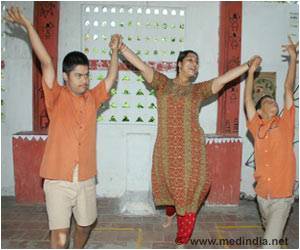
"It used to be thought that music was a superfluous thing, and no one understood why it developed from an evolutionary standpoint," Discover News quoted Michael De Georgia, director of the Center for Music and Medicine at Case Western Reserve University's University Hospitals Case Medical Center in Cleveland as saying.
"In the last 10 years, we've just started to understand how broad and diffuse the effect of music is on all parts of the brain.
"We are just starting to understand how powerful music can be. We don't know what the limits are."
During the post-World War II era, physical therapists observed that Big Band music helped wounded veterans get up and learn to walk again, according to Lee Anna Rasar, a musical therapist at the University of Wisconsin, Eau Claire.
Since then, researchers have recognized a consistent pattern. When given a rhythm to walk to, people with Parkinson's disease, strokes and other forms of neurological damage are able to regain a symmetrical stride and a sense of balance. Each beat acts as an auditory cue that the brain uses to anticipate timing and regulate footfalls.
Advertisement
Through music, then, patients can reach into their stored knowledge about words and use songs to create new connections for speech.
Advertisement
In a recent study with six autistic children who could not talk at all, Wan and colleagues found that music-based therapy helped all of them in articulating words and phrases in a better manner.
Some of the kids aged 5 to 9 years old said their first words after just eight weeks of music-based therapy, Wan said, and that was after years of other kinds of treatments.
"As much as we would like to say that music is a powerful medium, I think it's important for people to test it rigorously to try to really tease out what are the components that are contributing to the effects," Wan said.
"Is it because they are seeing a therapist five times a day or it's a new therapy so they're more motivated or is the therapy itself that is important?" she added.
Source-ANI














